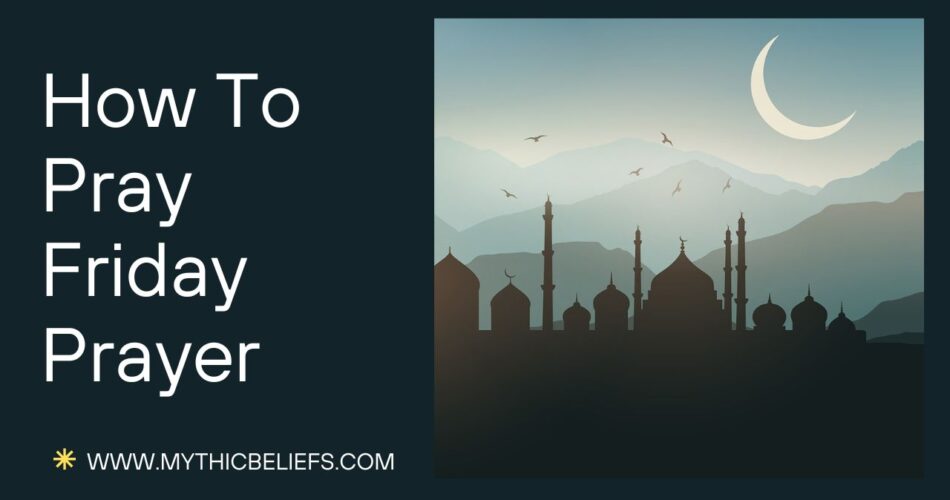If you have ever been confused as to how to do friday prayer—Jummah— which is more than just a weekly obligation. It’s a reset button, a spiritual recharge, a moment to step away from the rush of life and reconnect with faith and community. Whether you’re praying at home, at work, or in the mosque, the Friday prayer carries a special weight, and getting it right matters. Let’s break it down, step by step.
How Do You Pray the Friday Prayer?
If you’re heading to the mosque for Jummah, you’re in for something special. There’s a rhythm to it, a feeling of unity as people gather, shake off their worldly concerns, and prepare to listen to the khutbah (sermon).
Here’s how it goes:
- Ghusl (recommended but not mandatory) – Taking a bath before Friday prayer is Sunnah (a recommended practice of the Prophet). It’s a simple way to start fresh and show respect for the day.
- Wear your best clothes – You don’t need to be in a three-piece suit, but looking clean and presentable adds to the spirit of the prayer.
- Arrive early – Ever tried showing up late to a packed mosque? You’ll end up squeezed in the back or, worse, outside in the sun. Get there early to find a good spot and soak in the atmosphere.
- Listen to the Khutbah – The Friday sermon is part of the prayer. It’s two parts, with a short break in between, and it’s meant to be listened to in silence. Think of it like a TED Talk but with more wisdom and no PowerPoint slides.
- Two Rakats of Jummah Prayer – After the khutbah, the congregation prays two rakats (units) of Jummah prayer behind the imam. Simple, right?
- Additional Sunnah prayers – Once the main prayer is done, you can pray additional Sunnah prayers—two or four rakats before and after, depending on what school of thought you follow.
That’s it. Short, powerful, and packed with blessings.
How to Pray Jummah for Ladies?
This is a question I hear often: Do women have to pray Jummah in the mosque? The short answer—no, they don’t have to, but they can if they want to. Unlike men, who are obligated to attend, women have the flexibility to pray Dhuhr at home if they prefer.
But if you’re a woman who loves the communal feel of Jummah, go for it! If you can attend the mosque comfortably and safely, it’s a great way to be part of the spiritual energy. If not, praying Dhuhr at home is completely fine. Just make sure you pray four rakats instead of two, since there’s no khutbah in a home setting.
Can I Pray Friday Prayer Without a Bath?
Alright, let’s talk about the ghusl situation.
Is it mandatory? No. Is it highly recommended? Yes. Think of it this way: You wouldn’t show up to an important meeting or a special event without freshening up, right? Jummah is like a weekly VIP appointment with your faith. Taking a bath, clipping your nails, wearing clean clothes—it’s all part of getting into the right mindset.
But if you’re rushing from work or just don’t have time, don’t stress. As long as you’re in a state of wudu (ablution), you’re good to go.
How to Pray Friday Prayer at Home
There’s been a lot of talk about praying at home in recent years, especially during times of travel, illness, or global events (remember those lockdown Fridays?).
If you can’t make it to the mosque for a valid reason, you simply pray Dhuhr prayer instead of Jummah. That’s four rakats, just like on any other day. No khutbah needed. Simple and straightforward.
How to Pray Friday Prayer in the Mosque
If you’re heading to the mosque and wondering how to pray friday prayer in mosque, here’s a quick checklist to make sure you’re doing it right:
✔️ Make sure you’re on time—before the khutbah starts.
✔️ Listen attentively and don’t talk during the sermon.
✔️ Follow the imam for the two rakats of Jummah prayer.
✔️ Pray Sunnah prayers before or after if you wish.
✔️ Leave feeling spiritually recharged!
Wrapping It Up
Jummah isn’t just a prayer—it’s a weekly reminder to pause, reflect, and connect with something greater. Whether you’re at the mosque soaking in the khutbah or at home offering Dhuhr, what matters is that you take the time to be present in your worship.
What’s your favorite part of Friday prayer? The peaceful moment of sujood (prostration)? The powerful sense of community? Let me know in the comments—I’d love to hear your thoughts!
